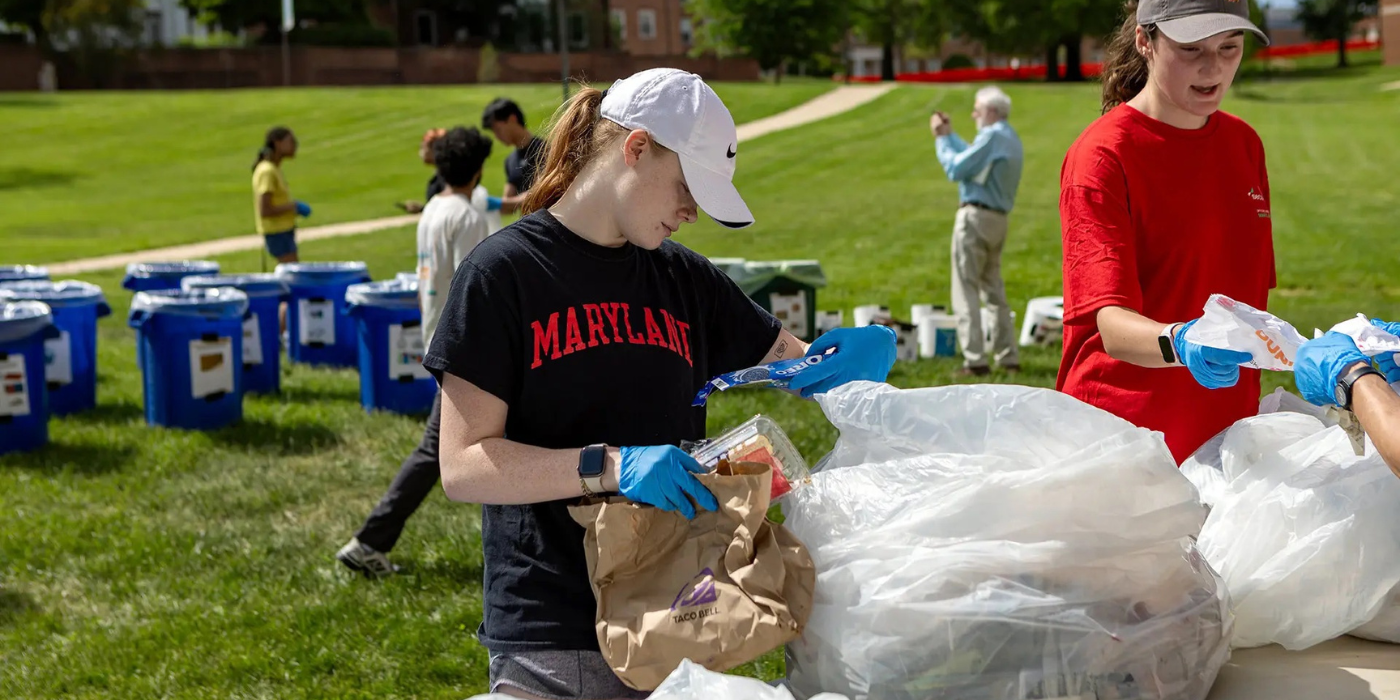The Dirty Details of McKeldin’s Trash
Library’s Waste Audit Gathers Info With Goal of Improving Sustainability

By Sala Levin '10
Gloves were plentiful. Full-body plastic suits were available. “If you feel like you’re going to be grossed out by any of the liquids, put one of these on,” warned Jessica Janney ’25, a recycling coordinator with UMD’s Facilities Management. On top of a long row of plastic tables, heaping garbage bags oozed, their dripping residue collecting on black tarps laid out on the ground. Smells, all of them unpleasant, wafted through the springtime air.
On Friday, roughly a dozen volunteers gathered for two hours to sort through a day’s worth of garbage from McKeldin Library as part of the first-ever waste audit of the University of Maryland’s main library. They tore through just over 88 pounds of waste, categorizing each item they encountered and dumping them into corresponding trash cans, as part of an attempt to get a better idea of how much and what kind of waste is being produced, and how to manage it more sustainably.
The waste audit is also a requirement of the Sustainable Library Certification Program, a national initiative designed to help libraries become more sustainable, to which UMD Libraries belongs.
“Waste audits are a massive undertaking,” said Julia Ethan ’24, MPH ’25, the sustainability graduate assistant for UMD Libraries, who worked with Facilities Management to organize the event. “They require a lot of equipment, and once you have the data, analyzing it and working through it is pretty complicated.”
At the waste audit, color-coded heavy-duty trash cans were set up behind the tables where volunteers picked through the garbage. Items destined for a landfill were placed in gray trash cans, recyclable materials in blue and compostables in green. (In 2023, UMD composted 2,425 tons of waste and recycled 45,539 tons, while sending 4,604 tons to a landfill.)
Food trash was a frequent flyer among the garbage, which was pre-collected by Facilities Management. Participants deposited empty bags of Goldfish crackers, cans of iced tea and Celsius energy drinks, and leftover Chinese food containers. A game-time decision was made on Chick-fil-A cups: For the purposes of this event, they were compostable, even though they have a waxy outer layer.
“We’re a very consumer-based nation,” said Daren Pefok ’28 as he gingerly picked through a garbage bag. “We’re always taking, taking, taking. And then we waste a lot,” he said, lifting up a Chick-fil-A container that still held three chicken strips.
Some volunteers had prior experience with digging through trash. Anya Pforzheimer, sustainability manager for Dining Services, has taken part in two previous waste audits at other jobs. “They’re really great for information-gathering,” she said. “It’s good to know how people are sorting on campus.”
Others embraced the squick. “This is something I’ve found when I’m outside doing field work in the mud–you just need to reach your hands in there, get them all muddy, and then you’re kind of over the mental hurdle,” said Holden Von Summer ’25, who’s double-majoring in earth science and economics.
Adrienne Small, who coordinates the recycling and solid waste program for Facilities Management, said that the data collected showed that while, overall, library visitors were doing a good job sorting their waste, there was room for improvement in ensuring that compostable materials made it to the proper bins, which are mainly available in McKeldin's bathrooms, staff kitchenettes and near Footnotes Cafe.
Ethan hopes that the event gave volunteers an appreciation not just for sustainability as a concept, but for the endeavor of waste management. “It’s really an eye-opener on how complicated trash is,” she said.
This story was originally published in Maryland Today on May 6, 2025.